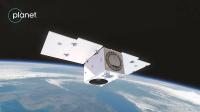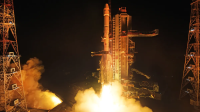Chinese launch company Orienspace has announced a successful Series B funding round worth nearly 600 million yuan ($83.5 million) shortly after its maiden launch, underscoring China‘s efforts to bolster its burgeoning commercial space sector.
The funding round, disclosed on January 24, attracted investment from notable entities including Liangxi Science and Technology Innovation Industry Fund of Funds, Hongtai Fund, Xin Ding Capital, CMBC International Holdings, Shanhang Capital, and Shenyin & Wanguo Investment. These funds are earmarked for the research and development of Orienspace’s debut liquid propellant rocket, dubbed the Gravity-2.
The Gravity-2 rocket, standing at 60 meters tall with a diameter of 4.2 meters, will utilize nine 100-ton-thrust Yuanli-85 gas generator engines for its first stage and incorporate solid boosters. Notably, the first stage is planned to be reusable, a feature increasingly prioritized in the aerospace industry.
Orienspace aims for the Gravity-2 to achieve a payload capacity of 25.6 tons to low Earth orbit (LEO), 19.1 tons to a 500-kilometer sun-synchronous orbit (SSO), or 7.7 tons to geostationary transfer orbit (GTO). The company aspires for the Gravity-2 to operate competitively in terms of price per kilogram compared to the SpaceX Falcon 9, with the inaugural launch projected for 2025 or 2026.
The funding announcement follows Orienspace’s successful debut launch of its Gravity-1 large, all-solid rocket on January 11, which carried a 3-ton prototype low-cost cargo spacecraft and satellites for customers. Despite a crowded field of competitors, Orienspace’s substantial funding round reflects investor confidence in the company’s prospects.
Established in 2020, Orienspace has swiftly emerged as a player in the Chinese commercial space industry, capitalizing on opportunities despite entering the sector relatively late. The company’s growth mirrors the broader trend of Chinese cities vying to attract space and high-end technology firms to drive innovation and economic expansion.
China’s commitment to nurturing its commercial space sector dates back to late 2014, with policies aimed at opening the industry to private capital and facilitating technology transfer through a military-civil fusion strategy. In December, the Chinese government identified the commercial space industry as a strategic emerging sector, aligning with efforts to enhance China’s space capabilities and global influence.
Orienspace CEO Yao Song has indicated the company’s readiness to fulfill orders for the launch of hundreds of satellites and participation in various satellite constellation projects, including the Guowang and Shanghai-backed G60 Starlink LEO broadband constellations. Additionally, Orienspace’s future plans include the development of larger launch vehicles, such as the Gravity-3, to meet evolving market demands.
As Orienspace progresses, it faces competition from a diverse array of commercial and state-backed entities also investing in reusable launcher technology, highlighting the dynamic nature of China’s commercial space landscape.







